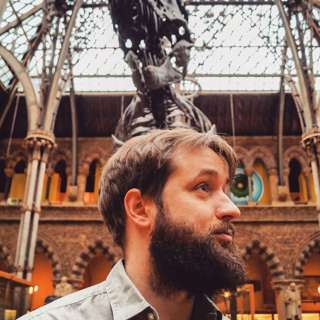
Rob's thoughts on the FTX bankruptcy
In this episode, usual host of the show Rob Wiblin gives his thoughts on the recent collapse of FTX. Click here for an official 80,000 Hours statement. And here are links to some potentially relevant 80,000 Hours pieces: • Episode #24 of this show – Stefan Schubert on why it’s a bad idea to break the rules, even if it’s for a good cause. • Is it ever OK to take a harmful job in order to do more good? An in-depth analysis • What are the 10 most harmful jobs? • Ways people trying to do good accidentally make things worse, and how to avoid them
23 Marras 20225min

#140 – Bear Braumoeller on the case that war isn't in decline
Is war in long-term decline? Steven Pinker's The Better Angels of Our Nature brought this previously obscure academic question to the centre of public debate, and pointed to rates of death in war to argue energetically that war is on the way out. But that idea divides war scholars and statisticians, and so Better Angels has prompted a spirited debate, with datasets and statistical analyses exchanged back and forth year after year. The lack of consensus has left a somewhat bewildered public (including host Rob Wiblin) unsure quite what to believe. Today's guest, professor in political science Bear Braumoeller, is one of the scholars who believes we lack convincing evidence that warlikeness is in long-term decline. He collected the analysis that led him to that conclusion in his 2019 book, Only the Dead: The Persistence of War in the Modern Age. Links to learn more, summary and full transcript. The question is of great practical importance. The US and PRC are entering a period of renewed great power competition, with Taiwan as a potential trigger for war, and Russia is once more invading and attempting to annex the territory of its neighbours. If war has been going out of fashion since the start of the Enlightenment, we might console ourselves that however nerve-wracking these present circumstances may feel, modern culture will throw up powerful barriers to another world war. But if we're as war-prone as we ever have been, one need only inspect the record of the 20th century to recoil in horror at what might await us in the 21st. Bear argues that the second reaction is the appropriate one. The world has gone up in flames many times through history, with roughly 0.5% of the population dying in the Napoleonic Wars, 1% in World War I, 3% in World War II, and perhaps 10% during the Mongol conquests. And with no reason to think similar catastrophes are any less likely today, complacency could lead us to sleepwalk into disaster. He gets to this conclusion primarily by analysing the datasets of the decades-old Correlates of War project, which aspires to track all interstate conflicts and battlefield deaths since 1815. In Only the Dead, he chops up and inspects this data dozens of different ways, to test if there are any shifts over time which seem larger than what could be explained by chance variation alone. In a nutshell, Bear simply finds no general trend in either direction from 1815 through today. It seems like, as philosopher George Santayana lamented in 1922, "only the dead have seen the end of war". In today's conversation, Bear and Rob discuss all of the above in more detail than even a usual 80,000 Hours podcast episode, as well as: • Why haven't modern ideas about the immorality of violence led to the decline of war, when it's such a natural thing to expect? • What would Bear's critics say in response to all this? • What do the optimists get right? • How does one do proper statistical tests for events that are clumped together, like war deaths? • Why are deaths in war so concentrated in a handful of the most extreme events? • Did the ideas of the Enlightenment promote nonviolence, on balance? • Were early states more or less violent than groups of hunter-gatherers? • If Bear is right, what can be done? • How did the 'Concert of Europe' or 'Bismarckian system' maintain peace in the 19th century? • Which wars are remarkable but largely unknown? Chapters:Rob’s intro (00:00:00)The interview begins (00:03:32)Only the Dead (00:06:28)The Enlightenment (00:16:47)Democratic peace theory (00:26:22)Is religion a key driver of war? (00:29:27)International orders (00:33:07)The Concert of Europe (00:42:15)The Bismarckian system (00:53:43)The current international order (00:58:16)The Better Angels of Our Nature (01:17:30)War datasets (01:32:03)Seeing patterns in data where none exist (01:45:32)Change-point analysis (01:49:33)Rates of violent death throughout history (01:54:32)War initiation (02:02:55)Escalation (02:17:57)Getting massively different results from the same data (02:28:38)How worried we should be (02:34:07)Most likely ways Only the Dead is wrong (02:36:25)Astonishing smaller wars (02:40:39)Producer: Keiran HarrisAudio mastering: Ryan KesslerTranscriptions: Katy Moore
8 Marras 20222h 47min

#139 – Alan Hájek on puzzles and paradoxes in probability and expected value
A casino offers you a game. A coin will be tossed. If it comes up heads on the first flip you win $2. If it comes up on the second flip you win $4. If it comes up on the third you win $8, the fourth you win $16, and so on. How much should you be willing to pay to play? The standard way of analysing gambling problems, ‘expected value’ — in which you multiply probabilities by the value of each outcome and then sum them up — says your expected earnings are infinite. You have a 50% chance of winning $2, for '0.5 * $2 = $1' in expected earnings. A 25% chance of winning $4, for '0.25 * $4 = $1' in expected earnings, and on and on. A never-ending series of $1s added together comes to infinity. And that's despite the fact that you know with certainty you can only ever win a finite amount! Today's guest — philosopher Alan Hájek of the Australian National University — thinks of much of philosophy as “the demolition of common sense followed by damage control” and is an expert on paradoxes related to probability and decision-making rules like “maximise expected value.” Links to learn more, summary and full transcript. The problem described above, known as the St. Petersburg paradox, has been a staple of the field since the 18th century, with many proposed solutions. In the interview, Alan explains how very natural attempts to resolve the paradox — such as factoring in the low likelihood that the casino can pay out very large sums, or the fact that money becomes less and less valuable the more of it you already have — fail to work as hoped. We might reject the setup as a hypothetical that could never exist in the real world, and therefore of mere intellectual curiosity. But Alan doesn't find that objection persuasive. If expected value fails in extreme cases, that should make us worry that something could be rotten at the heart of the standard procedure we use to make decisions in government, business, and nonprofits. These issues regularly show up in 80,000 Hours' efforts to try to find the best ways to improve the world, as the best approach will arguably involve long-shot attempts to do very large amounts of good. Consider which is better: saving one life for sure, or three lives with 50% probability? Expected value says the second, which will probably strike you as reasonable enough. But what if we repeat this process and evaluate the chance to save nine lives with 25% probability, or 27 lives with 12.5% probability, or after 17 more iterations, 3,486,784,401 lives with a 0.00000009% chance. Expected value says this final offer is better than the others — 1,000 times better, in fact. Ultimately Alan leans towards the view that our best choice is to “bite the bullet” and stick with expected value, even with its sometimes counterintuitive implications. Where we want to do damage control, we're better off looking for ways our probability estimates might be wrong. In today's conversation, Alan and Rob explore these issues and many others: • Simple rules of thumb for having philosophical insights • A key flaw that hid in Pascal's wager from the very beginning • Whether we have to simply ignore infinities because they mess everything up • What fundamentally is 'probability'? • Some of the many reasons 'frequentism' doesn't work as an account of probability • Why the standard account of counterfactuals in philosophy is deeply flawed • And why counterfactuals present a fatal problem for one sort of consequentialism Chapters:Rob’s intro (00:00:00)The interview begins (00:01:48)Philosophical methodology (00:02:54)Theories of probability (00:37:17)Everyday Bayesianism (00:46:01)Frequentism (01:04:56)Ranges of probabilities (01:16:23)Implications for how to live (01:21:24)Expected value (01:26:58)The St. Petersburg paradox (01:31:40)Pascal's wager (01:49:44)Using expected value in everyday life (02:03:53)Counterfactuals (02:16:38)Most counterfactuals are false (02:52:25)Relevance to objective consequentialism (03:09:47)Marker 18 (03:10:21)Alan’s best conference story (03:33:37)Producer: Keiran HarrisAudio mastering: Ben Cordell and Ryan KesslerTranscriptions: Katy Moore
28 Loka 20223h 38min

Preventing an AI-related catastrophe (Article)
Today’s release is a professional reading of our new problem profile on preventing an AI-related catastrophe, written by Benjamin Hilton. We expect that there will be substantial progress in AI in the next few decades, potentially even to the point where machines come to outperform humans in many, if not all, tasks. This could have enormous benefits, helping to solve currently intractable global problems, but could also pose severe risks. These risks could arise accidentally (for example, if we don’t find technical solutions to concerns about the safety of AI systems), or deliberately (for example, if AI systems worsen geopolitical conflict). We think more work needs to be done to reduce these risks. Some of these risks from advanced AI could be existential — meaning they could cause human extinction, or an equally permanent and severe disempowerment of humanity. There have not yet been any satisfying answers to concerns about how this rapidly approaching, transformative technology can be safely developed and integrated into our society. Finding answers to these concerns is very neglected, and may well be tractable. We estimate that there are around 300 people worldwide working directly on this. As a result, the possibility of AI-related catastrophe may be the world’s most pressing problem — and the best thing to work on for those who are well-placed to contribute. Promising options for working on this problem include technical research on how to create safe AI systems, strategy research into the particular risks AI might pose, and policy research into ways in which companies and governments could mitigate these risks. If worthwhile policies are developed, we’ll need people to put them in place and implement them. There are also many opportunities to have a big impact in a variety of complementary roles, such as operations management, journalism, earning to give, and more. If you want to check out the links, footnotes and figures in today’s article, you can find those here. Get this episode by subscribing to our podcast on the world’s most pressing problems and how to solve them: type ‘80,000 Hours’ into your podcasting app. Producer: Keiran Harris Editing and narration: Perrin Walker and Shaun Acker Audio proofing: Katy Moore
14 Loka 20222h 24min

#138 – Sharon Hewitt Rawlette on why pleasure and pain are the only things that intrinsically matter
What in the world is intrinsically good — good in itself even if it has no other effects? Over the millennia, people have offered many answers: joy, justice, equality, accomplishment, loving god, wisdom, and plenty more. The question is a classic that makes for great dorm-room philosophy discussion. But it's hardly just of academic interest. The issue of what (if anything) is intrinsically valuable bears on every action we take, whether we’re looking to improve our own lives, or to help others. The wrong answer might lead us to the wrong project and render our efforts to improve the world entirely ineffective. Today's guest, Sharon Hewitt Rawlette — philosopher and author of The Feeling of Value: Moral Realism Grounded in Phenomenal Consciousness — wants to resuscitate an answer to this question that is as old as philosophy itself. Links to learn more, summary, full transcript, and full version of this blog post. That idea, in a nutshell, is that there is only one thing of true intrinsic value: positive feelings and sensations. And similarly, there is only one thing that is intrinsically of negative value: suffering, pain, and other unpleasant sensations. Lots of other things are valuable too: friendship, fairness, loyalty, integrity, wealth, patience, houses, and so on. But they are only instrumentally valuable — that is to say, they’re valuable as means to the end of ensuring that all conscious beings experience more pleasure and other positive sensations, and less suffering. As Sharon notes, from Athens in 400 BC to Britain in 1850, the idea that only subjective experiences can be good or bad in themselves -- a position known as 'philosophical hedonism' -- has been one of the most enduringly popular ideas in ethics. And few will be taken aback by the notion that, all else equal, more pleasure is good and less suffering is bad. But can they really be the only intrinsically valuable things? Over the 20th century, philosophical hedonism became increasingly controversial in the face of some seemingly very counterintuitive implications. For this reason the famous philosopher of mind Thomas Nagel called The Feeling of Value "a radical and important philosophical contribution." In today's interview, Sharon explains the case for a theory of value grounded in subjective experiences, and why she believes the most popular counterarguments are misguided. Host Rob Wiblin and Sharon also cover: • The essential need to disentangle intrinsic, instrumental, and other sorts of value • Why Sharon’s arguments lead to hedonistic utilitarianism rather than hedonistic egoism (in which we only care about our own feelings) • How do people react to the 'experience machine' thought experiment when surveyed? • Why hedonism recommends often thinking and acting as though it were false • Whether it's crazy to think that relationships are only useful because of their effects on our subjective experiences • Whether it will ever be possible to eliminate pain, and whether doing so would be desirable • If we didn't have positive or negative experiences, whether that would cause us to simply never talk about goodness and badness • Whether the plausibility of hedonism is affected by our theory of mind • And plenty more Chapters:Rob’s intro (00:00:00)The interview begins (00:02:45)Metaethics (00:04:16)Anti-realism (00:10:39)Sharon's theory of moral realism (00:16:17)The history of hedonism (00:23:11)Intrinsic value vs instrumental value (00:28:49)Egoistic hedonism (00:36:30)Single axis of value (00:42:19)Key objections to Sharon’s brand of hedonism (00:56:18)The experience machine (01:06:08)Robot spouses (01:22:29)Most common misunderstanding of Sharon’s view (01:27:10)How might a hedonist actually live (01:37:46)The organ transplant case (01:53:34)Counterintuitive implications of hedonistic utilitarianism (02:03:40)How could we discover moral facts? (02:18:05)Producer: Keiran HarrisAudio mastering: Ryan KesslerTranscriptions: Katy Moore
30 Syys 20222h 24min

#137 – Andreas Mogensen on whether effective altruism is just for consequentialists
Effective altruism, in a slogan, aims to 'do the most good.' Utilitarianism, in a slogan, says we should act to 'produce the greatest good for the greatest number.' It's clear enough why utilitarians should be interested in the project of effective altruism. But what about the many people who reject utilitarianism? Today's guest, Andreas Mogensen — senior research fellow at Oxford University's Global Priorities Institute — rejects utilitarianism, but as he explains, this does little to dampen his enthusiasm for the project of effective altruism. Links to learn more, summary and full transcript. Andreas leans towards 'deontological' or rule-based theories of ethics, rather than 'consequentialist' theories like utilitarianism which look exclusively at the effects of a person's actions. Like most people involved in effective altruism, he parts ways with utilitarianism in rejecting its maximal level of demandingness, the idea that the ends justify the means, and the notion that the only moral reason for action is to benefit everyone in the world considered impartially. However, Andreas believes any plausible theory of morality must give some weight to the harms and benefits we provide to other people. If we can improve a stranger's wellbeing enormously at negligible cost to ourselves and without violating any other moral prohibition, that must be at minimum a praiseworthy thing to do. In a world as full of preventable suffering as our own, this simple 'principle of beneficence' is probably the only premise one needs to grant for the effective altruist project of identifying the most impactful ways to help others to be of great moral interest and importance. As an illustrative example Andreas refers to the Giving What We Can pledge to donate 10% of one's income to the most impactful charities available, a pledge he took in 2009. Many effective altruism enthusiasts have taken such a pledge, while others spend their careers trying to figure out the most cost-effective places pledgers can give, where they'll get the biggest 'bang for buck'. For someone living in a world as unequal as our own, this pledge at a very minimum gives an upper-middle class person in a rich country the chance to transfer money to someone living on about 1% as much as they do. The benefit an extremely poor recipient receives from the money is likely far more than the donor could get spending it on themselves. What arguments could a non-utilitarian moral theory mount against such giving? Many approaches to morality will say it's permissible not to give away 10% of your income to help others as effectively as is possible. But if they will almost all regard it as praiseworthy to benefit others without giving up something else of equivalent moral value, then Andreas argues they should be enthusiastic about effective altruism as an intellectual and practical project nonetheless. In this conversation, Andreas and Rob discuss how robust the above line of argument is, and also cover: • Should we treat thought experiments that feature very large numbers with great suspicion? • If we had to allow someone to die to avoid preventing the World Cup final from being broadcast to the world, is that permissible? • What might a virtue ethicist regard as 'doing the most good'? • If a deontological theory of morality parted ways with common effective altruist practices, how would that likely be? • If we can explain how we came to hold a view on a moral issue by referring to evolutionary selective pressures, should we disbelieve that view? Chapters:Rob’s intro (00:00:00)The interview begins (00:01:36)Deontology and effective altruism (00:04:59)Giving What We Can (00:28:56)Longtermism without consequentialism (00:38:01)Further differences between deontologists and consequentialists (00:44:13)Virtue ethics and effective altruism (01:08:15)Is Andreas really a deontologist? (01:13:26)Large number scepticism (01:21:11)Evolutionary debunking arguments (01:58:48)How Andreas’s views have changed (02:12:18)Derek Parfit’s influence on Andreas (02:17:27)Producer: Keiran HarrisAudio mastering: Ben Cordell and Beppe RådvikTranscriptions: Katy Moore
8 Syys 20222h 21min

#136 – Will MacAskill on what we owe the future
People who exist in the future deserve some degree of moral consideration.The future could be very big, very long, and/or very good.We can reasonably hope to influence whether people in the future exist, and how good or bad their lives are.So trying to make the world better for future generations is a key priority of our time.This is the simple four-step argument for 'longtermism' put forward in What We Owe The Future, the latest book from today's guest — University of Oxford philosopher and cofounder of the effective altruism community, Will MacAskill. Links to learn more, summary and full transcript. From one point of view this idea is common sense. We work on breakthroughs to treat cancer or end use of fossil fuels not just for people alive today, but because we hope such scientific advances will help our children, grandchildren, and great-grandchildren as well. Some who take this longtermist idea seriously work to develop broad-spectrum vaccines they hope will safeguard humanity against the sorts of extremely deadly pandemics that could permanently throw civilisation off track — the sort of project few could argue is not worthwhile. But Will is upfront that longtermism is also counterintuitive. To start with, he's willing to contemplate timescales far beyond what's typically discussed. A natural objection to thinking millions of years ahead is that it's hard enough to take actions that have positive effects that persist for hundreds of years, let alone “indefinitely.” It doesn't matter how important something might be if you can't predictably change it. This is one reason, among others, that Will was initially sceptical of longtermism and took years to come around. He preferred to focus on ending poverty and preventable diseases in ways he could directly see were working. But over seven years he gradually changed his mind, and in *What We Owe The Future*, Will argues that in fact there are clear ways we might act now that could benefit not just a few but *all* future generations. The idea that preventing human extinction would have long-lasting impacts is pretty intuitive. If we entirely disappear, we aren't coming back. But the idea that we can shape human values — not just for our age, but for all ages — is a surprising one that Will has come to more recently. In the book, he argues that what people value is far more fragile and historically contingent than it might first seem. For instance, today it feels like the abolition of slavery was an inevitable part of the arc of history. But Will lays out that the best research on the topic suggests otherwise. If moral progress really is so contingent, and bad ideas can persist almost without end, it raises the stakes for moral debate today. If we don't eliminate a bad practice now, it may be with us forever. In today's in-depth conversation, we discuss the possibility of a harmful moral 'lock-in' as well as: • How Will was eventually won over to longtermism • The three best lines of argument against longtermism • How to avoid moral fanaticism • Which technologies or events are most likely to have permanent effects • What 'longtermists' do today in practice • How to predict the long-term effect of our actions • Whether the future is likely to be good or bad • Concrete ideas to make the future better • What Will donates his money to personally • Potatoes and megafauna • And plenty moreChapters:Rob’s intro (00:00:00)The interview begins (00:01:36)What longtermism actually is (00:02:31)The case for longtermism (00:04:30)What longtermists are actually doing (00:15:54)Will’s personal journey (00:22:15)Strongest arguments against longtermism (00:42:28)Preventing extinction vs. improving the quality of the future (00:59:29)Is humanity likely to converge on doing the same thing regardless? (01:06:58)Lock-in scenario vs. long reflection (01:27:11)Is the future good in expectation? (01:32:29)Can we actually predictably influence the future positively? (01:47:27)Tiny probabilities of enormous value (01:53:40)Stagnation (02:19:04)Concrete suggestions (02:34:27)Where Will donates (02:39:40)Potatoes and megafauna (02:41:48)Producer: Keiran HarrisAudio mastering: Ben CordellTranscriptions: Katy Moore
15 Elo 20222h 54min

#135 – Samuel Charap on key lessons from five months of war in Ukraine
After a frenetic level of commentary during February and March, the war in Ukraine has faded into the background of our news coverage. But with the benefit of time we're in a much stronger position to understand what happened, why, whether there are broader lessons to take away, and how the conflict might be ended. And the conflict appears far from over. So today, we are returning to speak a second time with Samuel Charap — one of the US’s foremost experts on Russia’s relationship with former Soviet states, and coauthor of the 2017 book Everyone Loses: The Ukraine Crisis and the Ruinous Contest for Post-Soviet Eurasia. Links to learn more, summary and full transcript. As Sam lays out, Russia controls much of Ukraine's east and south, and seems to be preparing to politically incorporate that territory into Russia itself later in the year. At the same time, Ukraine is gearing up for a counteroffensive before defensive positions become dug in over winter. Each day the war continues it takes a toll on ordinary Ukrainians, contributes to a global food shortage, and leaves the US and Russia unable to coordinate on any other issues and at an elevated risk of direct conflict. In today's brisk conversation, Rob and Sam cover the following topics: • Current territorial control and the level of attrition within Russia’s and Ukraine's military forces. • Russia's current goals. • Whether Sam's views have changed since March on topics like: Putin's motivations, the wisdom of Ukraine's strategy, the likely impact of Western sanctions, and the risks from Finland and Sweden joining NATO before the war ends. • Why so many people incorrectly expected Russia to fully mobilise for war or persist with their original approach to the invasion. • Whether there's anything to learn from many of our worst fears -- such as the use of bioweapons on civilians -- not coming to pass. • What can be done to ensure some nuclear arms control agreement between the US and Russia remains in place after 2026 (when New START expires). • Why Sam considers a settlement proposal put forward by Ukraine in late March to be the most plausible way to end the war and ensure stability — though it's still a long shot. Chapters:Rob’s intro (00:00:00)The interview begins (00:02:31)The state of play in Ukraine (00:03:05)How things have changed since March (00:12:59)Has Russia learned from its mistakes? (00:23:40)Broader lessons (00:28:44)A possible way out (00:37:15) Producer: Keiran Harris Audio mastering: Ben Cordell and Ryan Kessler Transcriptions: Katy Moore
8 Elo 202254min






















